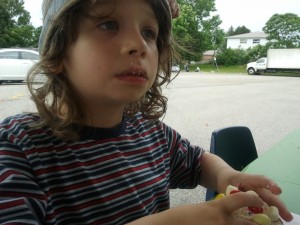When I tell people that my son has autism, the first question many of them ask is, “How did you know there was something wrong? What made you get him assessed?” Many people asking this question are having concerns about their own children, weighing up the idea of taking them to a pediatrician.
It would be so easy to point worried parents to websites listing early childhood development checklists and signs of autism, but that would only help a small number of people. The trouble with autism is that it is so individualised. It manifests in so many different ways. You get the kids who can’t string two words together but can rebuild a computer in two minutes flat. And you get the kids who are fully verbal but never learn to look both ways before crossing the street.
Here, I share my experiences with my son. Some parents will read these and nod along knowingly, identifying with every point. Others will wear a perplexed expression and say, “My child doesn’t do that.”
So, how did I know something was wrong?
1. Lack of speech or any other meaningful communication. By the time he was two, George was not talking. He had about thirty words in his vocabulary, but he was using fewer than ten of them in the right context. They were used as single words only, always for the purposes of requesting. Juice. Milk. Chee’s (Cheerios). He also did not have any kind of repertoire of meaningful gestures. He couldn’t point, and if he wanted something he did not know the word for, he would take my hand and move it in direction of the object he wanted.
2. No desire to play with other kids. When other kids his age were starting to play collaboratively with each other, George was still in parallel play mode. He did not object to the presence of other kids as long as he had the space to sit on his own and do his own thing. He did not see other people as potential playmates, but as functional beings: if he needed help to manipulate an object or separate stubborn Lego blocks, he would seek out an adult and shove the object into their hands. That was the extent of his interaction.
3. Not using toys for their intended purpose. Unlike some parents who say that their kids “became” autistic at a certain age, or after a certain event, I had a feeling fairly early on that there was something not quite right with George. One day, when he was at the age when babies are just learning to sit unsupported, I put him in the middle of the floor and propped him up with a nursing pillow. I surrounded him with all kinds of toys, just to see if he would respond to anything. There were stuffed animals, Lego’s of various sizes, fabric books, and a variety of planes, trains and automobiles. There was all kinds of stuff. He didn’t care for any of it. His attention wasn’t caught by the brightly coloured balls, and he didn’t make any attempt to grab at or swat any of the dangly things I tried to entice him with. He pushed a big red button on a train, and then grabbed a piece of string that was caught on my shirt and spent the next half-hour staring at it from different angles.
4. Prone to sensory overload. As a toddler, George hated going to the store. He would tolerate the grocery store for short amounts of time, but by the time I was at the checkout, he was usually having a meltdown of epic proportions. In those days before the autism diagnosis entered my orbit, I couldn’t understand what he was making such a fuss about. The only way for me to stop those meltdowns was by taking him out of the store. Looking back, I now realize that he was simply overwhelmed by everything that goes on in a store: fluorescent lights, lots of people, lots of displays, lots of sounds. Wal-Mart in particular set him off. Something about the checkout area sent him into a state of absolute panic.
5. Instinct. Ahhhh, there’s nothing quite like a mother’s gut feel. I have no idea if there is any science behind it, but mothers have this uncanny ability to just know there is something wrong with their child even though all looks fine and dandy to the outside world. This is why I always tell mothers that if they have a feeling something might be amiss with their child’s developmental progress, they should park themselves in their doctor’s office and insist on a referral for an assessment. There are doctors who will tell you to wait, that the range of development is broad, that boys reach milestones later than girls. Don’t listen to that guff. Don’t take no for answer. If you have to tell your doctor that you will sit in his office gathering dust until he gives you a referral, so be it. Listen to your instinct and don’t let anyone talk you into acting against it. I made that mistake and to this day, I bitterly regret the year of early intervention that my son missed as a result.
(Photo credit: Kirsten Doyle)










